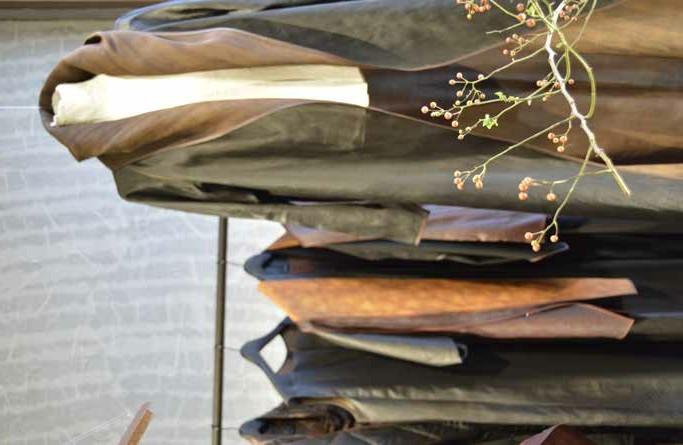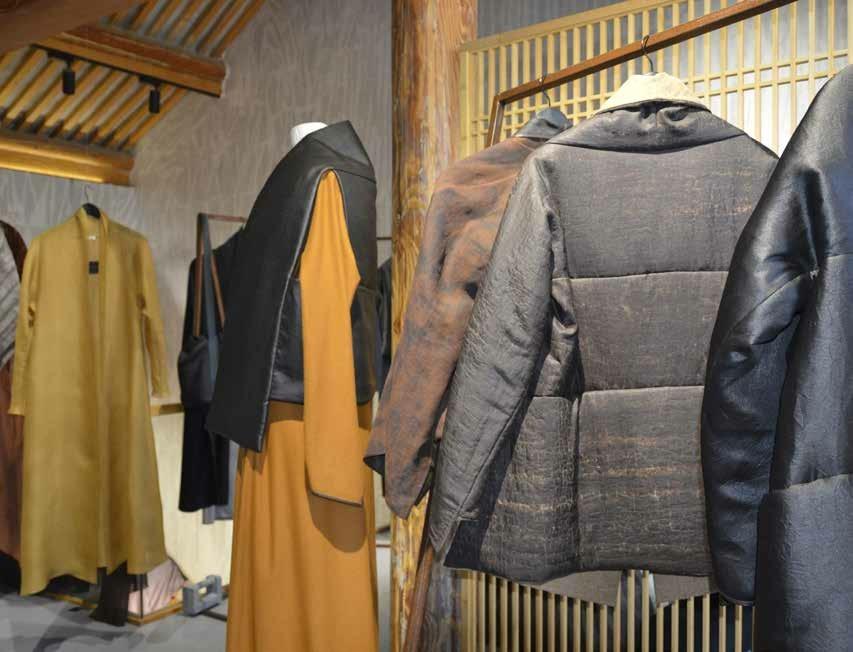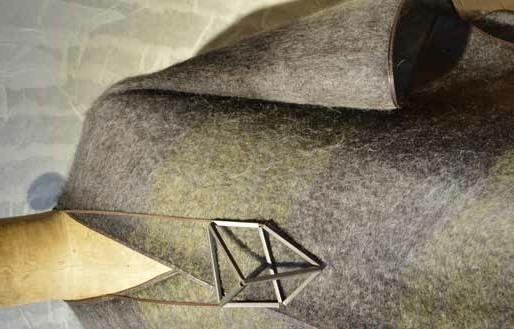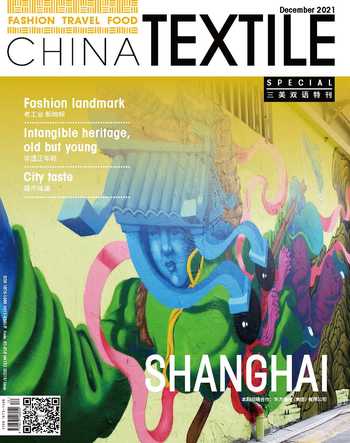香云纱与艺术,一个德国设计师的质朴生活
2021-01-22
她是首位获得“中国纺织非遗友谊大使”称号的国际友人;她将中式质感的香云纱融入西式的裁剪与风格,设计华贵儒雅;她曾多次受邀参加中央美术学院、中国丝绸博物馆、英国V&A博物馆、北京时装周,是当之无愧的艺术家。她就是德国服装设计师凯瑟琳·冯·瑞星博(Kathrin von Rechenberg)。
凯瑟琳与香云纱的相遇十分偶然。2000年,已经在Christian Dior、Chanel、Christian Lacroix等多个巴黎高级时装屋工作过的凯瑟琳,在朋友的介绍下只身来到中国,开启了自己的香云纱之旅,并创立了以自己名字命名的品牌rechenberg art couture。20多年来,几乎是靠口口相传而被大众熟知的rechenberg,以其独具特色的服装风格和可持续、传承中华非遗的理念,收获了众多国内外顧客的青睐。
一年将尽,新一年正启,本刊记者来到了位于北京前门大街的rechenberg,听凯瑟琳为我们讲述她的故事。
She is the first foreigner who won the title of "China Textile Intangible Cultural Heritage Friendship Ambassador"; she blends Chinese Xiangyunsha(also known as gambiered canton silk) into western tailoring and style, and the design is full of luxurious and elegant; she has been invited to participate in many exhibitions of Central Academy of Fine Arts, China Silk Museum, British V&A Museum, Beijing Fashion Week, etc. She is a well-deserved artist. She is the German fashion designer Kathrin von Rechenberg.
The encounter between Kathrin and Xiangyunsha was purely accidental. In 2000, Kathrin, who had worked in several Paris haute couture houses such as Christian Dior, Chanel, Christian Lacroix, etc., came to China alone with the introduction of her friend, started her own journey of finding Xiangyun yarn. Later, she founded same name brand rechenberg art couture. For more than 20 years, rechenberg, which is almost known to the public by word of mouth, has won the favor of many domestic and foreign customers with its unique clothing style and the concept of sustainable and intangible cultural heritage.
At the end of the year, we came to rechenberg in Beijing Qianmen Street in particular, to listen to Kathrin tell us her story.
CT:很多人都说rechenberg的服装具有一种非常独特的东方韵味,作为一个外国人,您怎么理解中国文化并运用在自己的品牌中?
凯瑟琳:中国文化对我来说最大的启发就是人与自然的连接。我在中国生活了20多年,使用的都是中国的面料,所以肯定具有一些中式的风格。使用香云纱的过程给了我很多灵感。首先是技术上的灵感。因为香云纱有两面,所以我一直在想如何让服装两面都可以穿。然后是裁剪和植物染等。我不想浪费面料,所以就使用整个宽幅的面料做衣服。其次香云纱教会了我要耐心。制作香云纱需要很长时间。起初我非常着急,不明白为什么不能很快拿到我的面料,但现在我特别理解,因为香云纱的制作受天气的限制。即使拿到香云纱也要过一段时间再使用。香云纱让我的心态变的平静。在染香云纱的过程中,也不能预测出到底会染出什么颜色,所以与其生气为什么颜色和自己想象的不同,还不如就让自然告诉自己要做什么。这可能就是中国文化给我的启示——不要强迫自己,顺应自然接受自己,把遇到的每个问题都当成一个机会。

CT:香云纱的颜色大多是比较深的颜色,您在设计的时候会受到颜色的限制吗?
凯瑟琳:十几岁的时候我喜欢明亮的颜色,不明白为什么妈妈喜欢穿棕色、米色这些不是很吸引人的颜色。但是现在我对颜色的认知改变了,我很喜欢黑色,鲜艳的颜色反而会另我感到不舒服。大街上到处都是鲜艳的颜色和灯光,也充斥着很多声音和音乐,一切都太快了,我们同时得到太多感官冲击,我需要一些东西让我的眼睛平静下来。这就是我喜欢大自然,喜欢这些平静的色彩的原因。我认为这才是更适合我的东西。
CT:今年九月,您受中央美术学院的邀请携真丝雕塑作品《莨·鞣》 参加“万物生息——后石油时代的材料与设计”展,您的心情如何?
凱瑟琳:我真的很感激中央美术学院找到我,并邀请我加入这个展览。在这之前,他们只是看到了我展出的一些作品而已。我从来没有做过这么庞大的工作,也不知道如何做艺术品,通过做这份工作,我经历了很多,也学到很多东西。以前我只是用薯莨染布料,但这次我开始用传统的工艺自己染色、过泥等。这项工作也让我从服装设计中获得了一些自由。我不用向别人展示我的技术有多么高超,只是表达自己。
CT:《莨·鞣》的作品名是什么意思?通过这个作品,您想向观众传递什么理念?
凯瑟琳:薯莨在很久以前被用来制作皮革,这个过程被称为鞣。对我来说,做香云纱的过程与制作皮革的过程有异曲同工之处。香云纱也是用薯莨染色,有的也看起来像是皮革,所以我就以此命名了这个作品。因为这个作品的外观比较像一个巨大的茧,所以这个作品的英文名字是薯莨·茧。这种形态也让人们思考它是如何缚茧、又是如何改变自己,重获新生的。
CT:怎么看待香云纱被大众称为“软黄金”?未来会考虑用其他的面料设计服装吗?
凯瑟琳:我真的不喜欢软黄金这个表达,以及人们宣传、谈论香云纱的方式。对我来说,这些都是营销,并不是现实。人们对香云纱有太多误解,每个人都在重复一些没有核实的事情。广东本地人以前穿香云纱,衣服破了他们会重新修补,这只是他们的一种生活方式。其他材质,我比较喜欢麻,非常反对将涤纶混纺的一些材料,因为它不能被回收。
CT:您什么时候开始对艺术产生了兴趣?还有哪些艺术给您带来了设计灵感?
凯瑟琳:我十岁就开始自己织毛衣了。爷爷和姥爷是陶艺师和雕塑师,家里有一个工作室,到处都是雕塑作品。我从小一直学习长笛,长笛老师教会了我很多。在家里我们也会一起讨论视觉艺术和音乐是怎么互相影响的,所以我自然而然地受到了一些艺术的熏陶。
我最近看了一个木版印刷的视频,很感兴趣。我也很喜欢书法,虽然我不认识中国字,但我喜欢这种需要全神贯注投入精力的艺术。书法看起来简单,但是不能改写重写。这里面有许多小细节,水多了或者水少了颜色就不一样了。以前黑色对我来说就是黑色,但现在我知道了黑色也能有这么多不同的颜色,我从这些简单的颜色和细节中找到了更多的乐趣。我觉得这是一种对自己的限制,限制自己的选择,专注于真正重要的事情。

CT:您多次为歌唱家龚琳娜设计表演服装,她会同您一起讨论服装的设计吗,还是您独立为她设计?
凯瑟琳:一开始我不认识龚琳娜,也不熟悉舞台上的表演服装需要怎么做。后来我知道了需要考虑一些技术的要求,比如她总是要一手拿着麦克风,或者袖子不能太短等。她一般不会把她想要的东西强加给我。每次她来的时候,总会挑选一些喜欢的服装,然后我们一起做一些事情。
在被问到有哪些喜爱的品牌时,凯瑟琳表示自己并没有特别喜欢的品牌,原因是她已经很久没有买过衣服了,她也并不需要很多的衣服。她笑着说,如果非要说点什么的话,她最喜欢的可能就是脚上正穿的靴子的品牌吧。这个品牌全世界只有两家门店,一家在巴黎,另一家在罗马。她说她喜欢这种小品牌扎扎实实的感觉,人们专注于自己的工艺和设计,一切只为了给顾客提供更好的产品和服务,正如她的rechenberg一样。
CT: Many people say that rechenberg has quite unique Chinese charm, as a foreigner, what do you understand Chinese culture and use it into your designing?
Kathrin: For me Chinese culture it’s always human with the nature linked together. I live in China for 20 years, and my pieces I am doing right now with Chinese materials so definitely it looks Chinese oriental style. But working with this material has inspired my whole work. For example, in technically wise, it has two sides one brown and another black, so i always searching for ways how the clothing could be worn on both sides. It’s not to waste the fabric so I am using the whole width, etc. The second is that the process of making Xiangyunsha made me patient. In the beginning, i was very in a hurry and I couldn’t understand why they cannot do my things fast, but now i know this is the weather which is deciding if you can dye and then also you need to leave the fabric for a while before you can use it some years. I’m becoming more calm. In the natural dye process, we cannot predict the reside exactly instead of being angry while the reside is not like what we imagined, so you just take it as a chance to tell you what to do. This is Chinese culture which is not to impose yourself on the nature but adapt yourself and take it as a chance.
CT: The colors of Xiangyunsha are mostly dark. Do you like other bright colors? Do you think the colors of Xiangyunsha limit your designing?
Kathrin: When I was very young, I also liked colors and didn’t understand why my mother likes to wear brown and beige these apparently not very appealing colors. But now my perception of colors changed, I always love black. I have to say I feel uncomfortable seeing bright colors, I need something calming my eyes because there are bright colors and lights everywhere on the street, also loud voices and music. We have too many impressions at the same time. Everything moves too fast. I am really avoiding things which are too massive and impressive, that’s why I prefer to go to nature and have calm colors. I think that’s something more suitable for me.

CT: In September this year, you were invited with your silk sculptures to take part in the exhibition “The life of things”by the Central Academy of Fine Arts, how do you feel about being involved in?
Kathrin: First of all, I am really grateful and touched that people came to me without knowing what I am doing just from seeing something I showed before, and asked me to do this exhibition. I was really touched by the trust, because I have never done such a huge work and I am not knowing for doing art. By doing this work, I experienced a lot and learned many things. I just used Shuliang dyeing fabrics before, but this time I started doing in traditional way by myself like dyeing, brushing, and exposing under the sun. Another thing is that the work gives me some freedom from clothing design. It’s not necessary for me to show everybody that I must be a sculptor.
CT: What is the meaning of the exhibit’s name? What are you trying to express through these silk sculptures?
Kathrin: Shuliang was used to make leather in the very old time before, the process is called tanning. For me, the process of making Xiangyunsha has something to do with tanning process. I also use shuliang to dye fabrics, and some of fabrics do seem like the texture of leather, that’s why I named it as tanning. And its English name is cocoon because of the appearance of the work. I think this artwork may let people think its transforming, how it makes the cocoon and how it transforms itself and how it comes out finally. In the end it’s kind of a transformation for myself by doing this work.
CT: What do you think about Xiangyunsha is often described as soft gold in fabric form? Have you considered trying other materials?
Kathrin: I really don’t like the expression and the way people are promoting or talking about Xiangyunsha. For me, these are all marketing tools which are attracting people but not reality. There are so many misunderstandings to it and everybody is repeating things which have been told once without verifying. The local people in Guangdong did wear Xiangyunsha at that time. When it was broken they would repair it, it was a lifestyle people there lived. In terms of other materials, I like linen, but it’s a little bit hard to find suitable linen in China. And I am very against mixing materials with polyester because it cannot be recycled.

CT: When did you find you had an interest in art? What other type of art have inspired your designing?
Kathrin: I started knitting sweater by myself since I was ten years old. My grandfathers are potter and sculptor. We have a workshop at home, and there are sculptures everywhere. I learned flute since young age, my flute teacher in Munich is really important for me as well, so I naturally gained some artistic influences.
I saw one artist who doing wood printing in videos recently, it’s just black and white but it is so beautiful. I like calligraphy as well. Even though I cannot read, I love this kind of art that you have to concentrate it without distraction. It seems like a simple technique, but you cannot change and redo it. There are so many little details in it, the colors are so different when there is more water or fading away. Before black is black for me but now there are so many different kind of blacks, I find much more pleasure in these simple colors and details instead of bright colors. I think it’s a restriction for yourself that you are limiting your choices and concentrating on something really important.
CT: You have designed for Chinese singer Gong Linna many times, do you discuss ideas for the design together or you work independently?
Kathrin: There are also some technical requirements, such as she always has to hold the microphone in one hand, or the sleeves are not allowed to be too short. She doesn’t impose something she needs to me. Usually when she is coming, she finds things she likes then we do something together.
When asked about her favorite brands, Kathrin said that she didn’t have favorite brands, because she hadn’t bought clothes for a long time, and she didn’t need many clothes in fact. She smiled and said that if she had to say something, her favorite brand might be the boots she was wearing on her feet. There are only two stores of the brand in the world, one in Paris and the other in Rome. She said that she likes the solid feeling of small brands. People focus on their own craftsmanship, and everything they did is to provide better products and services to their customer. Just like her brand rechenberg.
